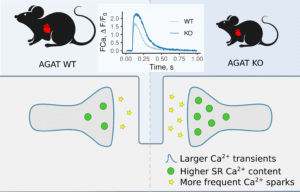Jelena Branovets, Martin Laasmaa, Jekaterina Stolova, Xin Shen, Triinu Rätsepso, Romain Bernasconi, Kärol Soodla, Mihkel Jaan Balodis, Cärolin Grahv, Eliise Hendrikson, William Edward Louch, Rikke Birkedal, and Marko Vendelin
American Journal of Physiology-Heart and Circulatory Physiology, 2025 Aug 1; 329(2): H471–H489
- PMID: 40657789
- DOI: 10.1152/ajpheart.00106.2025
Abstract
Creatine kinase (CK) is considered a crucial energy transfer system in cardiac muscle. Some studies have suggested that reduced CK energy transfer in the heart causes energy starvation, limits cardiac performance, and ultimately leads to heart failure. In agreement with this hypothesis, the hearts from creatine-deficient mice lacking arginine:glycine amidinotransferase (AGAT KO) have been shown, in some experiments, to resemble failing hearts. However, it is unclear if AGAT KO induces changes in cardiomyocyte substructure and Ca2+ cycling that resemble heart failure, including impairment of sarcoplasmic reticulum (SR) Ca2+ release and reuptake. To investigate this, we assessed functional and structural aspects of Ca2+ handling in cardiomyocytes from KO and WT littermates. We found minor, sex-dependent differences in the organization of transverse tubules and ryanodine receptors (RyRs), no differences in the expression and relative phosphorylation of RyR and PLB, but higher S100A1 expression levels. AGAT KO cardiomyocytes exhibited larger and longer Ca2+ transients with the same decay rate as WT. Ca2+ spark frequency and SR Ca2+ content were also increased in KO, while sodium-calcium exchanger activity was unchanged. Thus, our results strongly suggest that SR Ca2+ cycling is augmented in AGAT KO hearts. Although AGAT KO hearts also exhibited increased AMPK activation, suggesting higher levels of AMP/ADP, this did not detectably impair sarcoendoplasmic reticulum Ca2+-ATPase activity. In conclusion, the changes in AGAT KO cardiomyocytes are opposite to those in failing cardiomyocytes, showing that lifelong absence of CK energy transfer does not lead to heart failure.
NEW & NOTEWORTHY Previous studies have suggested that reduced creatine kinase (CK) activity may lead to heart failure. Here, we studied calcium handling in the hearts of creatine-deficient arginine-glycine amidino-transferase knockout (AGAT KO) mice with lifelong inhibition of CK. In contrast to failing cardiomyocyte
